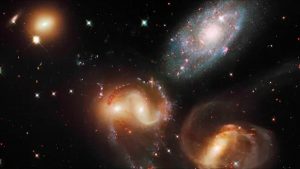North Korea ‘ready’ to test a nuclear weapon, claims South Korean PM Han Duck-soo
North Korea is “ready” to test a nuclear weapon and will likely do so, the prime minister of South Korea has said.
Speaking exclusively to Sky News, Han Duck-soo said that although it is “hard to know exactly when” a test would happen, “we gather that they are prepared”.
His comments come at a time when tensions on the Korean Peninsula are as high as they’ve been for several years.
In a wide-ranging interview, Prime Minister Han also said China’s recent relaxation of its strict zero COVID rules “should have come sooner” and said he’d like to see its powerful neighbour become “more rules-based”.
Prime Minister Han’s statements about North Korea come in the closing weeks of a year that has seen the isolated state fire more missiles, including intercontinental ballistic missiles, than at any other time since leader Kim Jong Un came to power in 2011.
Last month, one missile landed in the sea to the south of the ‘Northern Limit Line’, which is the unofficial maritime border between the two countries, and closer to the South Korean coast than ever before. Another flew over Japan.
If a nuclear test is undertaken, it will be the first since 2017 and will be a major escalation at an already very tense time.
“We always have preparations for that kind of very undesirable action,” said Prime Minster Han.
“We cannot say at this moment what kind of response will be made.
“But clearly we would like to have some kind of extended deterrence capabilities, including all kind of options.”
North Korea has implied it is responding, in part, to large-scale joint military drills held last month between South Korea and the United States, action it sees as threatening and provocative.
South Korea has a relatively new president and a relatively new government. Yoon Suk-yeol was elected in March and promised a more hawkish approach to North Korea.
His government has been accused of squandering some progress made by the previous administration, where dialogue between the two countries had increased.
‘We will secure peace on our terms’
This is a criticism wholly rejected by Prime Minister Han: “You may call our strengthening our deterrence capabilities the ‘harder line,’ but that’s a natural course for any country increasing the level of self-reliance in terms of security.
“We will secure our peace on our terms, not on terms dictated by North Korea.”
He also added intel on recent images of Kim Jong Un appearing alongside his daughter.
She accompanied him to recent missile launches and has never been seen in public before. She is believed to be aged nine or ten and some have speculated she may be being groomed for the leadership.
“The launching of an intercontinental missile will be, without any doubt, a big thing for North Korea,” said Prime Minister Han.
“If he would like to show something, then that would be a very opportune time.
“Possibly the appearance of his daughter, for him, he would like to deliver some message.”
On the campaign trail, Yoon Suk-yeol also implied strongly he would take a harder line on China and be more overt about South Korea’s alliance with the United States.
As a nation, it has had to walk a tight rope between the two superpowers – China is by far its biggest trading partner and both have important roles to play in the North Korean issue.
While keen to emphasise South Korea’s warm relationship with China, Prime Minister Han spoke in direct terms about the “very big impact” China’s zero COVID policy has had on South Korea and its economy, saying “it should have ended sooner”.
He also made clear South Korea agrees with its American ally when it comes to some issues regarding China.
“South Korea and China are a very, very intimate countries, and we will continue to do that,” he said.
“But Korea, with the international community, would like to see China be more rule-based and a more universal value respecting country.”
He was also clearer than the previous government about actively stepping up tri-lateral cooperation between the United States, Japan and South Korea. This is notable because it has previously been considered a ‘red line’ for China.
“Tri-lateral cooperation to guarantee the security and prosperity on the Korean Peninsula will be very definitely a necessity for us,” he said.
Domestically, Prime Minister Han noted that Korea, like many countries, has pressing economic challenges ahead, not least inflation, a weak currency and high housing costs.
Read more:
Meet Kim Jong Un’s possible successor
But this is a nation that plays an increasingly important role on the world stage and is aware of its position.
It recently bidded to host the 2030 World Expo in the southern city of Busan – with Mr Han wanting to showcase South Korea’s “structure of cooperation with other countries”.
But more action from North Korea is the eventuality that will most likely thrust it into the limelight.
Although South Korea insists it is committed to “dialogue”, the chance of a major de-escalation feels increasingly faint.



